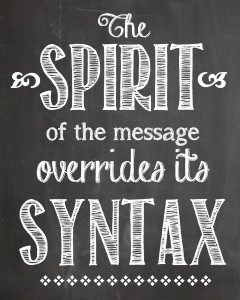Andy (a leader I met last week) was very disappointed. One of his employees had missed another deadline, making him and his whole team look bad with a high-profile client. Andy had learned that feedback was most valuable when shared in a timely manner, and he knew that he needed to start documenting performance. So he stopped what he was doing to have a conversation with the employee.
Andy: You missed another deadline today. Just like you did on August 11, 18, 25 and 27.
Employee: I know. I’m really sorry.
Andy: (exasperated sigh) When you blow these deadlines you make us all look bad.
What were you thinking?
By all external indicators, Andy followed the right  set of steps. He jumped on the issue, sharing feedback as soon after the incident as possible. He shared specifics — in fact, many. He outlined the impact of the employee’s behavior. And within fewer than 60 seconds, he asked a question to engage the employee. Andy followed all of his feedback-training tips. Yet it clearly didn’t hit the mark because the following day the employee allowed another deadline to slip.
set of steps. He jumped on the issue, sharing feedback as soon after the incident as possible. He shared specifics — in fact, many. He outlined the impact of the employee’s behavior. And within fewer than 60 seconds, he asked a question to engage the employee. Andy followed all of his feedback-training tips. Yet it clearly didn’t hit the mark because the following day the employee allowed another deadline to slip.
Despite what we may have been taught, the verbal formula you follow matters far less than the intentions we bring to a feedback conversation. The motivation of the feedback-giver trumps the techniques. The spirit of the message overrides its syntax. What comes from the heart overshadows what comes out of one’s mouth.
What kind of feedback do you give? Is it:
Feed (I’ll cover my) back? Too frequently leaders offer feedback to serve their own interests, not the interests of others. They need to be able to say they had a conversation with the employee. Or they need to create documentation so they can advance the corrective-action process. At its heart, this sort of feedback is about covering the leader, not about genuinely helping the employee. Despite the words that are spoken, employees feel it.
Feed (I’ll get you) back? Feedback can also be an emotional response to a set of circumstances. After all, leaders are only human. They experience disappointment, embarrassment and stress when those on their teams fail to perform as expected. Feedback shared within this emotional context can be judgmental, blaming and critical. Despite the words that are spoken, employees feel it.
Feed (I’ve got your) back? At its heart, genuinely helpful feedback springs from a spirit of service, partnership and support. It’s based on the belief that others are fundamentally able to learn, grow and perform. It’s also based on the assumption that people want to do their best for each other and the organization.
When leaders approach feedback with this mindset, the conversation (and the outcomes) are very different. The feedback becomes helpful information, empowering insights, and a motivating exchange. It communicates:
- You’re valued.
- I care about your success.
- I’m watching out for you.
And despite the words that are spoken, employees feel it. Feed (I’ve got your) back is a small but powerful shift that can enhance relationships and results.
We’ve all heard the expression “choose your words wisely,” but today try choosing your feedback intentions with equal care.
Image: Liz Price
This post originally appeared at Smart Blog on Leadership.


Another twist on a topic/POV that Julie has been developing for the past year or so. Well done and most timely.
Thanks, Peter. I always appreciate your perspective!
Julie:
This blog made me smile. Your coined phrases are easy to remember and apply. I will tuck this in my coaching “tool-box.” Thanks.
How lovely to hear from you, Judy. And I’m delighted to contribute a smile to your day!